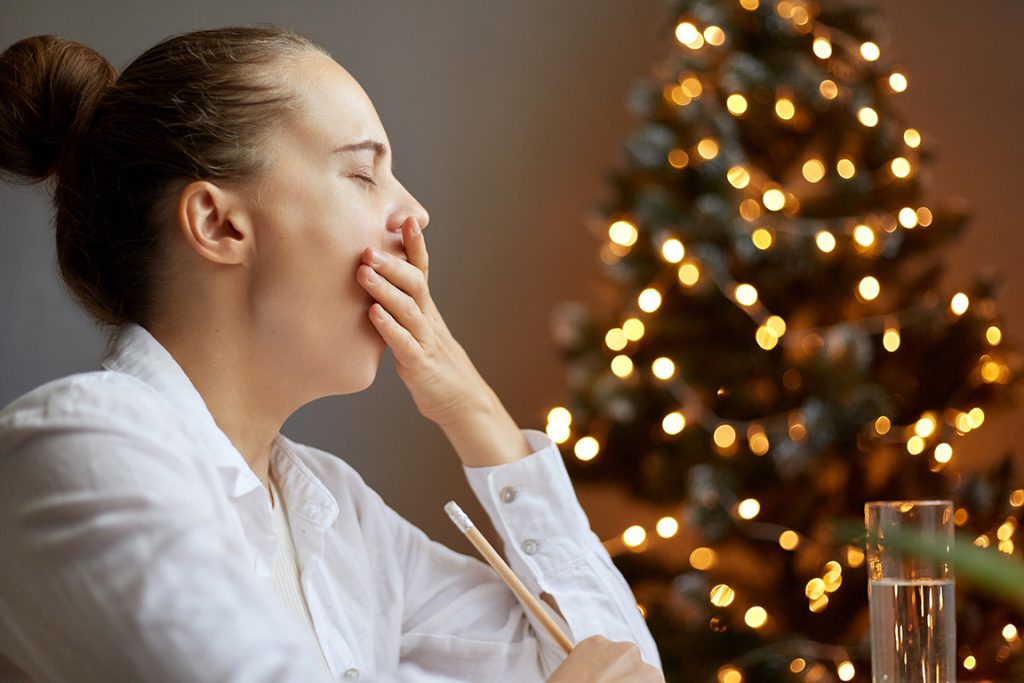
‘Tis the holiday season – dreams of pumpkin pie, turkey and stuffing, twinkly lights, and festive cheer abound. Sadly, there’s one thing that just might put a stop to it: tossing and turning all night in bed. Traveling during the holidays and staying with family can be challenging, especially when trying to get a restful night’s sleep. To help bring you stress-free slumber, we rounded up five common holiday sleep problems and how you can solve them. Get ready to snooze!
You Find Yourself in an Unfamiliar Sleep Environment
Oh, there’s no place like home for the holidays…or twisting yourself into a pretzel in your twin-sized childhood bed (which just doesn’t fit the same now) or passing out on your aunt’s lumpy couch. No matter where you’re sleeping, it’s going to be strange, especially the first night.
That’s thanks to first-night effect, which is common when you’re in a new environment. One study found that this happens because one brain hemisphere is more active at night, working to monitor unfamiliar sounds. This is why every creak in the floorboards seems louder and scarier in a new place.
To help deal with sleeping in a different environment, first find out as much as you can about where you’ll be sleeping. Does light stream through the window? Are there lots of random noises? Are the pillows comfortable?
After that, be sure to pack all your sleep essentials. These can include an eye mask, white noise machine (you can use a phone app too), or your favorite pillow. Whatever you need to slip into a perfect slumber, if you can pack it in your suitcase, it’ll go a long way in setting you up for sleep success.
Your Holiday Food Makes You Too Sleepy
From stuffing to pumpkin pie, holiday foods are some of the best to indulge in, but some of them, including ham, turkey, and sweet potatoes, are notorious for making you sleepy after dinner. If you want to avoid the midday nap, trying indulging in smaller quantities. You may also want to skip the alcohol, which will just make you sleepier. An afternoon walk in the crisp air outside will also help you perk up and give you the energy boost you need to power through the day.
On the flip side, if you’re looking to nap right after lunch, feel free to nosh away on your holiday faves. Why? Sweet potatoes are high in calcium, magnesium, and potassium, which promote muscle relaxation. Turkey and ham contain the amino acid tryptophan, which is why you immediately want to take a nap after digging in. John Hopkins Children’s Hospital explains that after tryptophan travels through the digestive system, it enters the brain, where it’s changed into serotonin, a chemical that can help calm down the body (which helps it prepare for sleep).
Preparing for Time Changes
If you’ve ever traveled internationally or sprung forward or back three or more hours, you’ve likely experienced jet lag, which can mess with your circadian rhythm.
To prepare for this, try and move your wake and bedtimes to match your new time zone a couple days before you plan to leave. (Psst…using our jet lag calculator can help you figure out exactly what time you should go to bed.) Once you arrive in your new time zone, try to expose yourself to as much sunlight as possible. Lastly, to avoid sleep fatigue, schedule in naps to your holiday schedule.
Keeping Consistency
The holidays should be a time when people relax and take a break; however this sometimes isn’t the case. Stuff just seems to have a way of piling up – shopping for loved ones, airport delays, holiday parties, work – and being in a new environment doesn’t help.
To help overcome some of this stress, try to keep your routine as consistent as possible, including making your bed every day if you’re already in the habit of it, and going to bed and getting up at the same time every morning. Practicing good sleep hygiene will help you feel less sleepy and improve the sleep you do get.
Being Unable to Wind Down
With the hustle and bustle of the day, it can be hard winding down for sleep, especially in a different environment. To make sleep easier, establish a travel wind-down routine. This can be meditating before bed, ensuring your space is dark and cool, journaling, or anything you find relaxing. Limiting your exposure to blue light will also help your mind slow down.



























